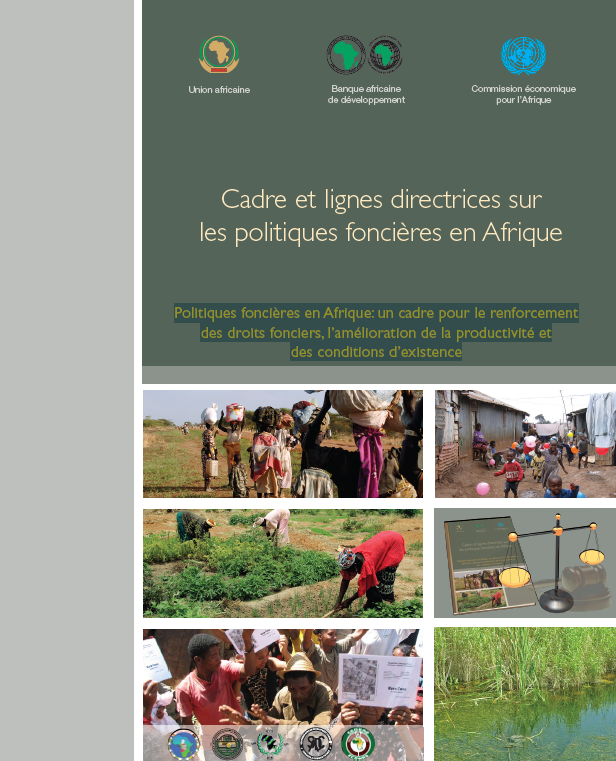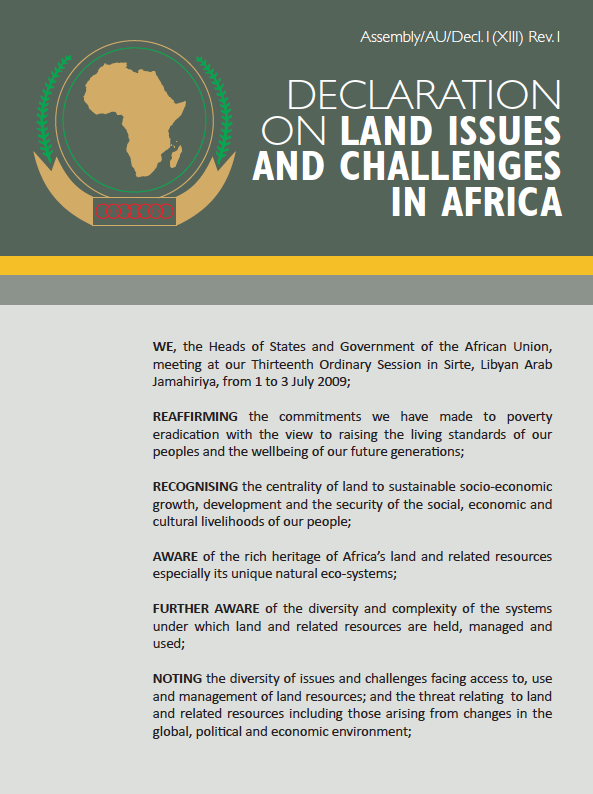Location
The African Land Policy Centre, formerly called the Land Policy Initiative (LPI), is a joint programme of the tripartite consortium consisting of the African Union Commission (AUC), the African Development Bank (AfDB) and United Nations Economic Commission for Africa (ECA). Its purpose is to enable the use of land to lend impetus to the process of African development. The programme is governed by a Steering Committee that meets periodically, while a joint secretariat implements day to day activities. The secretariat is assisted by an African Taskforce on Land.
After having developed the Framework and Guidelines (F&G) on land policy in Africa, and received the mandate from the African Union (AU) to use it in support of national and regional land policy processes, the LPI is now moving towards assisting AU Member States in developing or reviewing their land policies as well as in implementing and evaluating these policies.
Vision
A peaceful and prosperous Africa realized through equitable access, efficient and sustainable utilization of land.
Mission
To ensure all land users have equitable access to land and security of all bundles of land rights, by facilitating effective partnerships, dialogue and capacity building for participatory and consultative land policy formulation and implementation, as well as efficient and transparent land administration in both customary and statutory jurisdictions.
Goal
To assist Member States in the implementation of the declaration on land issues and challenges in Africa in accordance with the Framework and Guidelines on land policy in Africa in order to achieve socio-economic development, peace and security, and environmental sustainability.
Current targets of the initiative include:
Twenty Member States developing land policies and adopting implementation tools that enhance women’s secure access to land; and recognize the legitimacy of Africa’s customary based land rights and institutions by 2020
Ten Member States putting in place transparent, efficient and cost-effective Land administration systems which are reflective of Africa’s unique realities by 2020
Members:
Resources
Displaying 31 - 35 of 35Cadre et lignes directrices sur les politiques foncières en Afrique
En 2006, la Commission de l’Union Africaine (CUA), la Commission Economique pour l’Afrique (CEA) et la Banque africaine de Développement (BAD) ont unis leurs efforts dans le cadre d’une initiative désormais connue sous le nom d’Initiative conjointe sur les politiques foncières en Afrique. L’objectif de cette initiative était de travailler sur les problèmes et enjeux relatifs aux politiques foncières en Afrique, dans la perspective du développement d’un cadre visant le renforcement des droits fonciers, l’accroissement de la productivité et l’amélioration des conditions de vie.
Cadre et lignes directrices sur les politiques foncières en Afrique
En 2006, la Commission de l’Union Africaine (CUA), la Commission Economique pour l’Afrique (CEA) et la Banque africaine de Développement (BAD) ont unis leurs efforts dans le cadre d’une initiative désormais connue sous le nom d’Initiative conjointe sur les politiques foncières en Afrique. L’objectif de cette initiative était de travailler sur les problèmes et enjeux relatifs aux politiques foncières en Afrique, dans la perspective du développement d’un cadre visant le renforcement des droits fonciers, l’accroissement de la productivité et l’amélioration des conditions de vie.
Declaration on land issues and challenges in Africa
Declaration on land issues and challenges in Africa
Assembly/AU/Decl.1(XIII) Rev.1
Déclaration sur les problems et enjeux fonciers en Afrique
Déclaration sur les problems et enjeux fonciers en Afrique
Assembly/AU/Decl.1(XIII) Rev.1
Support to Implementation of the Voluntary Guidelines on the Responsible Governance of Tenure of Land, Fisheri
General
The Addendum to the project "Supporting Implementation of the Voluntary Guidelines on the Responsible Governance of Tenure of Land, Fisheries and Forests" is aimed at (i) facilitating mainstreaming of VGGT and sharing of lessons across multiple countries and regions at Pan-African level and within the Sahel region. The expected output of the intervention includes integrated ALPC-FAO approach to land policy change at continental level, coordinated contextualization of FAO capacity development materials and learning programmes and a strategy for institutionalized integrated implementation of VGGT and F&G; (ii) improving governance of tenure in pastoralism in selected countries in West Africa within the Sahel region. This intervention is expected to result in improved governance of tenure in pastoralist communities through support to ECOWAS, awareness raising, contextualization of capacity development of ECOWAS and CSOs, compilation of best practices on mitigation, prevention and managing pastoralist conflicts and piloting the FAO Technical Guide on Governance of Pastoral Lands.





